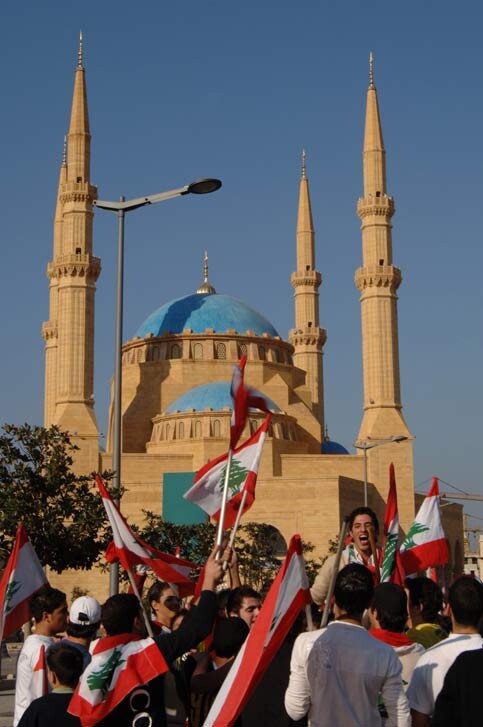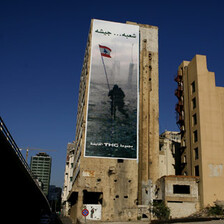International Crisis Group 21 December 2006

Hundreds of thousands of opposition supporters wave Lebanese flags during a demonstration in a bid to bring down the government, Beirut, 1 December 2006. (Dina Debbas/IRIN)
Overview
Lebanon has badly lost its balance and is at risk of new collapse, moving ever closer to explosive Sunni-Shiite polarisation with a divided, debilitated Christian community in between. The fragile political and sectarian equilibrium established since the end of its bloody civil war in 1990 was never a panacea and came at heavy cost. It depended on Western and Israeli acquiescence in Syria’s tutelage and a domestic system that hindered urgently needed internal reforms, and change was long overdue. But the upsetting of the old equilibrium, due in no small part to a tug-of-war by outsiders over its future, has been chaotic and deeply divisive, pitting one half of the country against the other. Both Lebanon’s own politicians and outside players need to recognise the enormous risks of a zero-sum struggle and seek compromises before it is too late.
There is domestic responsibility for the crisis. Profound confessional rifts were never fully healed after the civil war; society is hopelessly fragmented along clan, family, regional, social and ideological lines; there are no genuinely sovereign, credible and strong state institutions; and above all, a corrupt patronage system has created vested interests in perpetuating both sectarianism and a weak central state.
But the principal contributors to today’s conflict are foreign. Lebanon is vital to the Bush administration’s regional strategy, Israel’s security, Tehran’s ambitions and the Syrian regime’s core interests. As the July war reminded everyone, it is also a surrogate for regional and international conflicts: Syria against Israel; the U.S. administration against the Syrian regime; pro-Western Sunni Arab regimes led by Saudi Arabia against ascendant Iran and Shiite militancy; and, hovering above it all, Washington against Tehran.
Domestic and foreign roots of the crisis are closely intertwined. Lebanon’s sectarian fabric, feeble state institutions, reliance on patronage and enmeshment in corruption enable and encourage the outside interference on which so many of its leaders depend. At one end of the political spectrum, a coalition of opposition forces relies on Damascus for political and material assistance and, in Hizbollah’s case, military supplies.
But the parliamentary majority - the March 14 alliance that formed in reaction to the 2005 assassination of ex-Prime Minister Hariri - also depends on outsiders, in this case Western countries that provide financial, diplomatic and political support. It is hard even to make out their domestic program. Their agenda essentially boils down to three international initiatives: the forthcoming Paris III conference to increase donor aid; implementation of UN Security Council Resolution 1701 to contain Hizbollah; and an international tribunal to prosecute those responsible for the killing of former Prime Minister Hariri and, implicitly, to deter further Syrian interference.
The confrontation originally centred on Hizbollah’s armed status but has since become sharply focused on the tribunal issue and the related matter of government composition. The tribunal is not critical to Hizbollah but is highly threatening to the Syrian regime, which sees it as a political instrument in enemy hands; Hizbollah is not subordinate to Damascus but is sufficiently dependent on its help not to risk antagonising it on a vital matter. Without Syria, there can be no military re-supply and without such re-supply, there cannot be a sustained resistance against Israel (muqawama). Consequently, Hizbollah insists on gaining veto power in the government to control the tribunal’s fate.
The March 14 alliance banks on its parliamentary majority, cabinet control and - critically - backing from key Western and Arab governments to assert itself and contain Syrian ambitions. Moving swiftly on the tribunal and in effect indicting the Syrian regime is the centrepiece of this strategy.
The political impasse has led both sides to call out their followers. Street politics have replaced institutional politics. Huge demonstrations on one side trigger colossal protests from the other. This is not coup plotters against democrats, or a popular uprising against an illegitimate state. It is one street against the other, one Lebanon against another. Mobilising mass support is how this conflict is being waged: it is not how it will be resolved.
One half of the country cannot rule without, let alone against, the other. The clash over Lebanon’s future will have tragic human consequences. A sectarian split in a context of heavy outside interference will have inevitable and dangerous regional implications. An acceptable compromise will be extraordinarily difficult - at least a half dozen creative proposals, principally by the Arab League, have failed - but it must be found. Any sustainable peace will need to be built upon the following foundations:
Resolution by consensus of the current hair-trigger issues: the tribunal and government composition. With a political and ideological conflict dovetailing with an international and sectarian one, neither side can afford to lose, and neither can govern alone: outside actors must take this into account. The Hizbollah-led opposition demands veto power in a new government that would then consider the tribunal but the March 14 group is certain such a government would never defy Syria. The opposition also calls for early parliamentary elections, claiming the current chamber distorts the real political balance of power. With public opinion strongly supporting both a unity government and the tribunal, there is pressure on both sides. The nub of the problem, and key to its solution, is sequencing. Based on many ideas already mooted, Crisis Group proposes:
Settling the question of Syria. Washington’s strategy of pressure, isolation and implicit threats of regime change has backfired. Damascus has proved it may destabilise Lebanon if what it considers its vital interests are ignored or if it feels cornered. There can be no stable solution for Lebanon without a viable solution for Syria. Washington and Damascus need to discuss each other’s concerns regarding, in particular:
Addressing the structural roots of its predicament. While necessarily a longer run objective, this means taking up forgotten elements of the Taif agreement that ended the civil war, notably de-confessionalisation:
Related Links


